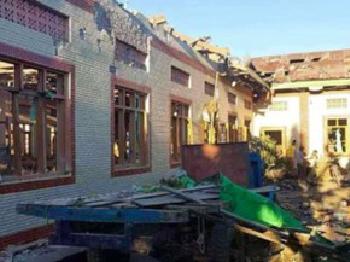Days before the military coup in Myanmar (Burma) nationalist Buddhist monks demonstrated in support of the army, also known at the Tatmadaw.
The monks marched through the streets of Yangon with banners that apparently supported the claims of election fraud that the military have cited as the pretext for seizing power and overthrowing Aung San Suu Kyi’s democratically-elected government. Other slogans proclaimed the Tatmadaw as a “protector of the state”.

In the West, few associate Buddhism with extremism or violence. However, political interests have often overridden pacifism in Asian Buddhist movements, which have been supportive of the use of force to achieve nationalist or other political agendas that they consider to be in their interests.
In Myanmar there seems to be no exception and Buddhist leaders are frequently vocal on political matters, with many taking a strongly nationalist stance in a country where Buddhism is deeply interconnected with culture and national identity.
Buddhist extremists may see coup as opportunity to further nationalist ideals
For the Buddhist nationalist extremists, who backed the army and its campaign of ethnic cleansing against Rohingya Muslims, the coup may seem like an opportunity to further their nationalist ideals.
In May 2020, militant Buddhist leader Ashin Wirathu, who was once jailed for hate speech, openly rejected the non-violent teachings of his religion. At a rally speaking out in criticism of the International Criminal Court’s decision to pursue a case against Myanmar’s military persecution of the mainly-Muslim Rohingya ethnic group he said, “The day that the ICC comes here is the day I hold a gun,” adding, “Only the military protects both our country and our religion.”
In a report that condemned as genocide the ethnic cleansing perpetrated against the Rohingya by the Tatmadaw, the UN said that similar “persecutory intent” was evident in the military’s atrocities against Kachin and other mainly Christian ethnic minorities, describing these as a “crime against humanity”.
Since at least the end of British rule, the Buddhist monastic community (sangha) has played an instrumental role in the politics of Myanmar. Following the transition to democratic government in 2011, the shift in power allowed nationalist Buddhist movements to gain traction in the ensuing power struggle, such as the Patriotic Association of Myanmar and the 969 Movement. Nationalist Buddhist monks have also been influential historically in other Buddhist nations in South-East Asia, including during the 1915 riots against the Tamil people in Sri Lanka.
A chilling Myanmar Army document discovered soon after the military coup in February instructed soldiers to open fire on, as well as “punish and breakdown”, civilians, including ethnic-minority Christians and other minorities, deemed to be against the military regime, or even appearing critical of it in social media posts.
In Myanmar 87% of the population is Buddhist, and the identity of the ethnic-Burman majority is tied to Buddhism. Christianity is portrayed as a foreign religion and most Christians are from non-Burman ethnic minorities including the Chin, Karen and Kachin. Buddhism is the de facto state religion, and prior to the coup in 2021 the military retained considerable power in Aung San Suu Kyi’s government. For decades, the government has brutally oppressed Christian and Muslim ethnic minority groups, leading to hundreds of thousands of people being displaced, often by aerial bombardment. Ultra-nationalist monks, including members of the extremist Ma Ba Tha group, have played a key part in inciting violence against Christians and refusing them the right to congregate for worship.

